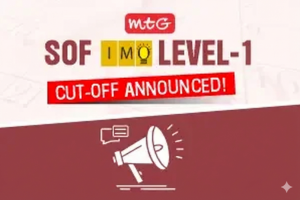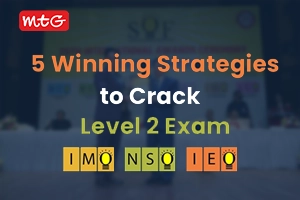The day of an exam is just as important as the preparation leading up to it. After months of studying, being organized and calm on the big day ensures you can perform your best. This is especially true for SOF Olympiads (such as the NSO, IMO, IEO, NCO, IGKO, ISSO, and IHO) where a little planning prevents last-minute stress. Both students and parents have a role to play – from making sure all essentials are ready to encouraging a positive mindset. In this blog, we provide a friendly yet comprehensive Olympiad exam-day checklist of do’s and don’ts to help you sail through the Level 1 exam day with confidence.
Exam-Day Do’s
Here are the things you should do on the day of your Olympiad exam:
Before Leaving Home (Exam Morning)
-
Get a Good Night’s Sleep: Ensure you sleep for about 7–8 hours the night before so you wake up fresh and alert. Staying up late to cram can leave you tired and unfocused during the exam.
-
Eat a Healthy Breakfast: Don’t skip your morning meal! A nutritious breakfast will fuel your brain and improve exam performance. Choose slow-release energy foods (such as whole grains, fruit, or eggs) to stay full and energized throughout the test. Parents can help by preparing a light, healthy breakfast to boost concentration.
-
Double-Check Exam Details: Re-confirm the exam date, reporting time, and venue/location before you set out. Knowing exactly when and where to go prevents any confusion or panic. If the exam is at school, be aware of which room or hall it will be held in. If it’s at an external center, plan your route.
-
Gather All Important Documents: Keep your Admit Card (hall ticket) ready – with a recent passport-size photo affixed and signed by school authorities if required. Also carry your school ID card for identification, as it may be checked at the venue. It’s a good idea for parents to verify that these documents are in the bag before leaving home.
-
Pack Your Stationery and Essentials: Prepare a transparent pouch with all the items you’ll need. Bring at least 2 blue or black ballpoint pens (in case one runs out) and a couple of sharp HB pencils for filling the OMR sheet or rough work. Don’t forget a good eraser and sharpener. If your exam might involve calculations or drawing diagrams (for example, in math), pack a geometry ruler and basic instruments – it’s better to have them just in case. A clear water bottle is also a good idea to stay hydrated (make sure it’s transparent with no labels). Parents can ensure all these items are organized the night before to avoid any morning rush.
-
Set Alarms and Start Early: Give yourself plenty of time on exam morning. Set an alarm (or two!) so you wake up on time. Aim to leave early for the exam – anticipate traffic or any delays. It’s better to arrive early than to stress about being late.
At the Exam Centre (Before the Test Begins)
-
Arrive at least 30 Minutes Early: Plan to reach the exam center well ahead of the start time. Arriving about half an hour early is recommended. This gives you time to find your room or seat, settle down, and calm your nerves. Rushing in the last minute can increase anxiety, so avoid that scenario.
-
Listen to Instructions: Once you’re seated, pay attention to the invigilators and any announcements. They will likely go over rules, how to fill details on the answer sheet, and other important guidelines. If they specify whether to use pen or pencil for answering, follow those instructions (Olympiad answers are usually m on an OMR sheet using an HB pencil or blue/black pen). Knowing the rules will help you avoid simple mistakes.
-
Stay Calm and Positive: It’s normal to feel butterflies, but try some relaxation techniques to stay composed. Take a few deep breaths to steady yourself. Remind yourself that you’ve prepared and you’ve got this! Parents can give a few encouraging words before the child enters the hall – a positive mindset can boost confidence.
-
Check Your Essentials (One Last Time): Before the exam starts, quickly check that you have your admit card and ID in your possession, your pens/pencils ready, etc. Usually only the admit card and writing instruments are allowed on your desk, so make sure everything else (water bottle, etc.) is placed as instructed. Being organized at your desk means you won’t fumble for things once the clock starts.
(Note for parents: You won’t be allowed inside the exam hall with your child, as per Olympiad rules. Instead, support them from outside – ensure they’re on time, and then wait patiently until the exam is over.)
During the Exam
-
Read the Instructions and Questions Carefully: The first thing you should do when you receive the question paper is read the instructions on it. Make sure you understand the marking scheme and how to mark your answers. Misreading instructions is a common cause of mistakes. Also, read each question carefully before answering – sometimes a single word can change the meaning of the question.
-
Manage Your Time: Keep an eye on the time (there should be a wall clock in the room, since usually personal watches are not allowed). Olympiad Level 1 exams are typically 60 minutes long. Plan to complete your paper within that time by not spending too long on any one question. If you get stuck on a difficult question, it’s wise to skip it for the moment and attempt all the ones you know first. You can always come back to the tough questions if time permits.
-
Use Rough Paper for Work: For calculations or rough sketches (for example, in math problems or logical reasoning), use the margins of your question paper or any rough sheet provided. The Olympiad allows rough work on the question paper itself, so you don’t need to carry separate paper. Doing rough work neatly in one place helps you avoid confusion and keeps the answer sheet clean.
-
Attempt Every Question: In SOF Olympiads, there is no negative marking for wrong answers. That means you won’t lose marks for a wrong answer. So, it is usually better to attempt all questions, even if you are not 100% sure about some. If time is running out, make your best guess for any remaining questions rather than leaving them blank – you might get some correct and you have nothing to lose.
-
Fill the OMR Sheet Carefully: If your class uses an OMR answer sheet (typically classes 3 and above do), be very careful while marking your answers. Use an HB pencil (or ball pen if instructed) to darken the correct circle completely for each question. Only mark one circle per question. Avoid stray marks on the sheet, and erase any mistakes cleanly if you used pencil. An improperly filled OMR can lead to the machine misreading your answers, so take your time to fill it correctly. Also, write your name, roll number, and other details on the answer sheet as instructed – don’t forget to sign it if required.
-
Stay Focused and Don’t Panic: If you encounter a tough question, don’t let it shake your confidence. It’s okay – Olympiad papers are designed to have a mix of easy and challenging questions. Focus on solving what you know first. If a question seems confusing, skip it and return to it later with a fresh perspective. Keep calm and use your common sense and knowledge. Sometimes taking a couple of deep breaths can help clear your mind if you feel anxious.
-
Use All Your Time: If you happen to finish early, don’t rush to turn in your paper. Use the remaining time to review your answers. Check if you have missed any question or accidentally left any OMR bubble blank. Re-read tricky questions to ensure you interpreted them correctly. Checking your work can help catch mistakes or fill anything you overlooked. Remember, you’re usually not allowed to leave the hall early, even if you are done. So use every minute to your advantage.
By following these Do’s, you set yourself up for a smooth exam experience. Being well-prepared on exam day – from bringing the right materials to managing time – can greatly boost your confidence and performance!
Essential Preparation Blogs for SOF Olympiads
- How to Prepare for SOF ICO Olympiad Exam? ICO Preparation Tips!
- How To Prepare For International Mathematics Olympiad (IMO)?
- Preparation Tips for International Computer Science Olympiad (ICSO)
- How to Prepare for SOF ISSO Olympiad Exam?
- Study Plan for SOF IGKO Olympiad Exam
- Study Plan for SOF IEO Olympiad Exam
Don’ts on Exam Day
Now that we know what to do, let’s go over what not to do. Avoiding these common mistakes will save you from unnecessary stress or penalties:
-
Don’t arrive late to the exam: Time management starts before the exam! Running late can not only raise your anxiety but might even bar you from entering if you miss the reporting time. Plan to reach the venue with time to spare – arriving late is one of the biggest exam-day mistakes to avoid.
-
Don’t skip breakfast or stay hungry: As mentioned, not eating can leave you tired and distracted. Skipping breakfast has been linked to poorer academic performance. So, don’t go to the exam on an empty stomach thinking it will save time. Also, avoid taking the exam thirsty – a small sip of water can help if your mouth is dry or you feel uneasy.
-
Don’t forget to bring required documents: Not having your admit card or school ID can create a huge problem. Never leave these at home. Double-check that your admit card (with photo pasted and signed by school) is in your bag before you head out. Forgetting it might mean you’re not allowed to sit for the test. Similarly, don’t forget your glasses (if you wear them) or any hearing aid/medical item you need – you won’t perform well if you can’t see the paper clearly or address a health need.
-
Don’t carry banned or unnecessary items: Avoid bringing any electronic gadgets or notes to the exam hall. Mobile phones, calculators, tablets, or any such devices are strictly prohibited. Carrying these can get you disqualified from the Olympiad. Leave your phone with your parents or at home. Also, don’t bring textbooks, revision notes, or pieces of paper into the exam room – absolutely no cheat sheets! The exam is meant to test your knowledge and honest effort. Even a suspicion of cheating material can lead to serious consequences. It’s best to carry only what’s allowed: typically, your admit card, ID, pen/pencil, etc. (Tip: Using a transparent pencil box or zipper pouch helps invigilators see that you’re not hiding anything).
-
Don’t wear a digital or smart watch: In many exams, watches are not allowed inside the hall. Some centers might allow a basic analog watch, but to be safe, it’s better not to wear one or ask the invigilator if a simple watch is okay. There will be a clock in the room to check time. Avoid anything that could even remotely be mistaken for a gadget.
-
Don’t start new topics on exam day: Exam morning is not the time to learn brand-new chapters or formulas. Trust your preparation. Trying to cover new material in a hurry can increase panic and confusion. It’s okay to lightly review key points or formulas if it helps you feel confident, but don’t attempt to relearn everything at the last minute. Similarly, avoid chatting with friends about “Did you study this or that?” right before the exam – such conversations can create self-doubt. Keep calm and stick to what you know.
-
Don’t exhaust yourself before the exam: Avoid heavy physical activity or anything that can make you very tired right before the test. For example, don’t engage in strenuous sports on the morning of exam day. You want to be energetic and fresh when the exam begins. Also, don’t pull an all-nighter studying – lack of sleep will harm your performance more than that extra revision would help.
-
Don’t engage in unfair practices: This should go without saying, but never consider cheating or copying answers. Do not talk to other students during the exam (if you have a question, direct it to the invigilator by raising your hand). Trying to use unfair means can get you expelled from the exam hall immediately, and your result may be canceled. It’s simply not worth it. Olympiads are competitive, but they must also be fair – trust your own preparation and do your best.
-
Don’t panic if you encounter difficulties: Keep your cool throughout the exam. If you hit a tough question or momentarily go blank, don’t say “I can’t do it.” Avoid negative self-talk or panicking. Take a deep breath, skip the question for now, and move on. Don’t spend too long worrying about one problem while you could be answering others. Panic can block your thinking – staying calm helps you think clearly and remember what you have learned.
-
Don’t leave the exam early (even if you finished): Use the full allotted time to re-check your work. Students sometimes make the mistake of leaving questions unanswered or making bubbling mistakes in a hurry to leave early. Since you’re usually not permitted to leave until the exam ends, use that time wisely. Don’t just sit idle – go over your answers. Make sure your OMR sheet is filled correctly, your name/roll number is written, and all questions have an answer marked. This final review can catch any simple mistakes (like mis-marked answers or skipping a question) and give you a chance to correct them.
By steering clear of these don’ts, you can avoid common pitfalls that trip up students. In short: don’t be late, don’t be unprepared, and don’t break the rules. If you’ve come this far in your preparation, you definitely don’t want an avoidable error to spoil your exam day!
Olympiad Exam Day Checklist
Below is a handy Exam Day Checklist for your Olympiad Level 1 exam. You can print this out or save it and tick off each item to ensure nothing is missed on the big day:
-
Admit Card – Printed hall ticket with your photo affixed and signed by school authorities (if required)
-
School ID Card – Your school identification for verification at the exam center
-
Pens and Pencils – Blue or black ballpoint pens (carry at least two) and sharp HB/2B pencils for marking answers. Include an eraser and sharpener for pencils.
-
Transparent Stationery Pouch – Keep all pens, pencils, eraser, etc., in a clear bag or pencil box. No papers or gadgets in it.
-
Other Allowed Tools – Ruler, geometry tools (if needed for diagrams) and basic non-programmable calculator (only if the exam explicitly allows it; generally, SOF Olympiads do not allow calculators). For most subjects, calculators are not permitted, so this is usually not applicable.
-
Water Bottle – Transparent bottle with water to keep yourself hydrated (remove any label). Optional: A small packet of tissues or a handkerchief.
-
Personal Items – If you use glasses, hearing aids, an inhaler, or any medication, pack those. Make sure invigilators are informed of any medical needs.
-
Exam Venue Route Planned – Know how you’re getting to the exam venue. If it’s at school, be aware of the room number. If it’s an external center, have the address and route handy (parents can help plan transportation).
-
Arrival Time – Plan to arrive ~30 minutes early to the exam center. Leave home with plenty of buffer time.
-
Healthy Breakfast – Eat a light, nutritious breakfast on the morning of the exam. Also, use the restroom before leaving for the exam or before the test starts.
-
Positive Mindset – Take a deep breath and stay confident. Remember that feeling a bit nervous is normal, but you’ve prepared well. Keep a positive attitude as you walk into the exam hall.
By following this checklist, students and parents can ensure that exam day goes smoothly without any last-minute hiccups. Being well-prepared with all essentials and knowing the do’s and don’ts will help the student focus solely on what really matters – doing their best on the exam.
Also Check – How SOF Olympiads Help Students Build Skills for a Bright Future





























